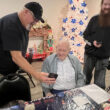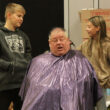Sean C. Morgan
The public is invited to attend a special event next week, a conversation, at Sunshine Industries to talk about the disability community in the larger context of the Sweet Home community.
The disability community accounts for 12 percent of the U.S. population and nearly 14 percent of the population in Oregon.
“All Oregonians are influenced by the disability community, whether as individuals with a disability or as family members, friends or allies of someone with a disability,” said Brittany Donnell, program developer at Sunshine Industries.
This is the focus of “Understanding Disability: Family and Community Stories,” a free conversation with Jill Crawford Hurt set for 3 p.m. Wednesday, May 13, at Sunshine Industries’ headquarters, 1333 Clark Mill Road. The program is hosted by Sunshine Industries and sponsored by Oregon Humanities through its Conversation Project.
Participants in the conversation will look at what they know of the stories of their own family, friends and colleagues and consider the sources of their perspectives, Donnell said. “Whether these stories contain themes of pride, oppression, resistance, failure or success, they offer us an opportunity to rethink our perceptions.”
Hurt is a “proud member” of the disability community, Donnell said. As the second of three generations to share a hereditary neuropathy, she devotes her personal and professional life to disability advocacy and youth peer support activities and serving as director of a parent advocacy organization.
Through the Conversation Project, Oregon Humanities offers free programs that engage community members in thoughtful, challenging conversations about ideas critical to daily and Oregon’s future, Donnell said.
“We really feel this is going to bring a beneficial opportunity to our community to come together and talk about individual experiences with the disability community,” Donnell said, how it’s impacted people.
It’s a group discussion meant to serve as a “catalyst event” to bring the disability community to the forefront of people’s minds, she said, to explore how those with disabilities interact in the community and discuss changes that might be beneficial.
Changes are coming to the way programs like Sunshine Industries are funded and the way they’ll function.
Former Gov. John Kitzhaber issued an executive order in 2008 creating a statewide Employment First policy, based on a nationwide initiative. Oregon was one of the first states to adopt the policy.
“Employment First says everybody can work,” Donnell said. “Every individual can work, including those with development and mental disabilities, regardless of their disabilities, at or above minimum wage.”
It says they can work in their communities outside of sheltered workshops, and those with disabilities are transitioning away from sheltered work., she said. During the conversation, Sunshine officials want to find out what Sunshine can do to continue serving the disability community and the community of Sweet Home.
“What are your ideas?” she asked. “How would you feel about somebody coming and working at your place of employment?”
The idea is to get everyone on the same page and make employment for those with disabilities a goal, she said. It’s not the only topic, though.
Many of the people Sunshine serves already have “really good” relationships with the Sweet Home community, Donnell said. The community has been positive, and Sweet Home people value their relationships with the people Sunshine serves.
Sunshine wants to hear about those relationships and about ideas and concerns going forward, Donnell said.
For more information about the conversation, contact Donnell at (541) 367-2765 or at [email protected].
Sunshine Industries takes a holistic approach to working with the developmentally disabled. The center provides a microcosm of the outside world to prepare clients for the mainstream modern world in a safe and nurturing environment, training disabled individuals to be more independent through assessment and practical instruction. It provides social opportunities for its clients along with employment, including a janitorial service, document shredding, grounds keeping and a wood shop.
Oregon Humanities connects Oregonians to ideas to change lives and transform communities. For more information about Oregon Humanities’ programs and publications, which include the Conversation Project, Think & Drink, Humanity in Perspective, Idea Lab, public grant programs and Oregon Humanities magazine, visit oregonhumanities.org.
The organization is an independent nonprofit affiliate of the National Endowment for the Humanities and a partner of the Oregon Cultural Trust.




